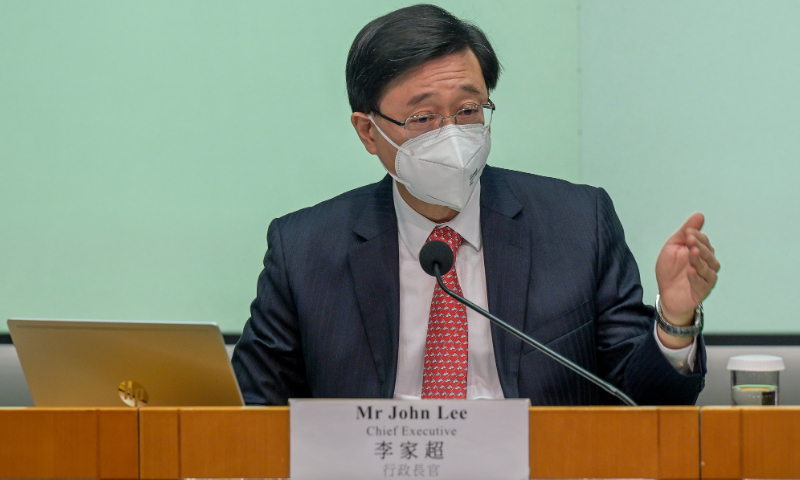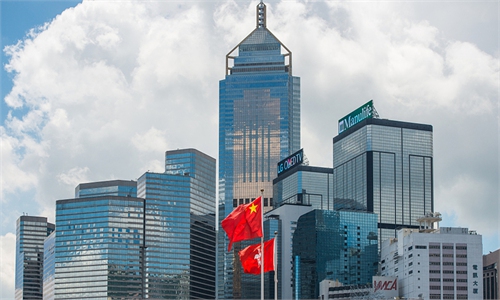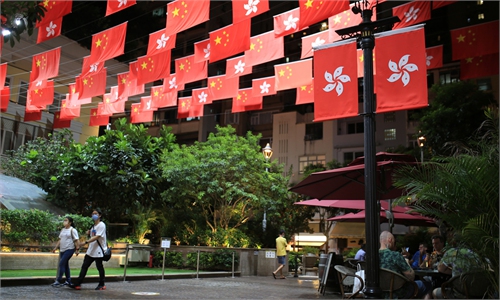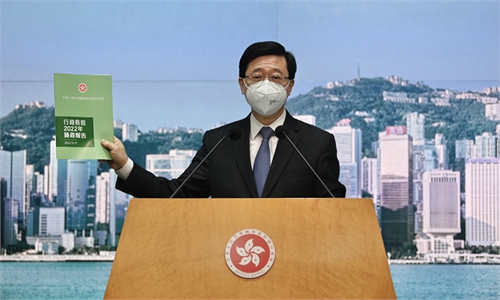HKSAR announces ‘largest-ever’ program to ‘trawl the world for talents’
‘Largest-ever’ program, mainland’s support to attract professionals

John Lee Ka-chiu, Chief Executive of the Hong Kong Special Administrative Region is seen at the press conference on The Chief Executive's 2022 Policy Address on October 19, 2022 in Hong Kong, China. Photo: VCG
Hong Kong Special Administrative Region (HKSAR) Chief Executive John Lee Ka-chiu delivered his first policy address on Wednesday, in which he announced what has been described as the largest-ever policy package the city has rolled out to attract talent.
The HKSAR's new talent attraction program contains even more stimulus than the talent policy of Singapore, one of Asia's major financial and innovation hubs, which is widely known for its friendliness in drawing global professionals, analysts noted.
Western doomsayers have spared no effort in slandering the measures, saying that such measures won't reverse "the exodus of professionals" from Hong Kong, but analysts said that the HKSAR's advantages, including firm support form the Chinese mainland, will help attract more global professionals.
"Over the past two years, the local workforce shrank by about 140 000. Apart from actively nurturing and retaining local talents, the Government will proactively trawl the world for talents," Lee said in the policy address.
The policy address proposed measures such as launching the Top Talent Pass Scheme for two years, refunding the extra stamp duty paid by eligible incoming professionals in purchasing local residential property, and other aspects.
Those eligible for the policy support include individuals with an annual salary of at least HK$2.5 million ($318,502) in the past year and graduates from the world's top 100 universities.
The program doesn't have any geographic limits, so qualified professionals can make their way to Hong Kong, Nicholas Muk, vice chairman of the Hong Kong Federation of Education Workers, told the Global Times on Thursday.
Hong Kong's new policy "is even better and more aggressive than Singapore's talent policy - it's stronger and more flexible," Bloomberg reported on Wednesday, citing Ricky Chiu, chairman and chief executive officer of PHASE Scientific International.
Gary Wong Chi-him, board member of the Chinese Association of Hong Kong and Macao Studies, noted that even though Hong Kong has seen some short-term outflows of labor affected by the COVID-19 pandemic, the city will not be easily replaced by other markets, especially amid its stable social development.
Wong said that the pilot program is a new and flexible attempt in the HKSAR, which can be subsequently adjusted based on the actual implementation. He noted that retaining talent is also about retaining the momentum of Hong Kong's development.
Muk noted that the HKSAR government has also offered other benefits such as tax breaks and housing policies, so the package will be appealing to global professionals.
For instance, Lee said that eligible incoming experts who become permanent residents can seek a refund of the extra stamp duty paid for purchasing residential property in Hong Kong.
In addition, the support from the Chinese mainland, the huge market and development potential in the mainland and the Guangdong-Hong Kong-Macao Greater Bay Area are the major advantages for the HKSAR to trawl for talent in the medium to long term, as the city has been working to achieve goals aligning with the 14th Five-Year Plan (2021-25), analysts noted.
"Hong Kong is one of the most competitive economies in the world. It also serves as an important gateway connecting the Chinese mainland with global markets. We must be more proactive and aggressive in 'competing for enterprises' and 'competing for talent'," said Lee.
Apart from talent attraction, the HKSAR will also set aside HK$30 billion from the Future Fund to establish the Co-Investment Fund for attracting enterprises to set up operations in the city, per the policy address.
The HKSAR financial secretary has set up a new Hong Kong Investment Corp to further optimize the use of fiscal reserves for promoting the development of industries and the economy, which will consolidate several funds established under the Future Fund as well as the Co-Investment Fund and relevant resources under the steer of the HKSAR government to invest in strategic industries, according to the policy address.
Wong said that the establishment of the corporation and the fund reflected the HKSAR government's goal of attracting businesses, while also showing the further support of the central government.



